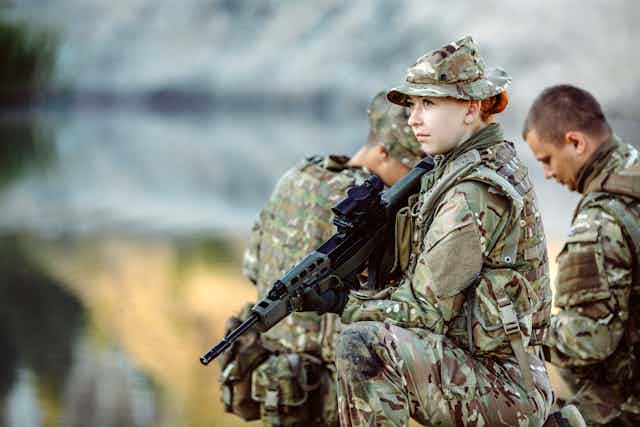At last, a ban that has long restricted women’s roles within the British military is to be lifted. For years, sceptics and fearmongers have influenced policy and public opinion in the UK preventing women from serving in ground close combat roles, “where the primary role is to close with and kill the enemy”; stopping female soldiers from joining the Royal Marines, RAF Regiment, infantry and armoured regiments.
Myths regarding women’s physical inferiority, questionable mental discipline and emotional stability, to name a few, have long been disproved by research and finally it seems like policy has caught up with the facts. From November, a phased implementation of the new policy will see women becoming eligible to crew tanks in the Royal Armoured Corps alongside their male crewman. This three-year phased approach will then be extended to all areas of the military including the Royal Marines and the Parachute Regiment by late 2018.
Considering this timescale, there is still plenty of time for the policy to be amended or stalled, as has happened in other countries: in January this year, the US – just one month after announcing all combat jobs would be open to women with no exceptions – stated that their “gender-neutral” policy wouldn’t actually include Special Forces units.
Having women on the frontline is a contentious topic in many areas of the world, including the UK. And one very important question still needs to be asked: will women want to serve in ground combat roles?
There is certainly no shortage of female talent in the military, yet it remains to be seen whether they have the appetite for offensive close combat. Since the announcement on July 8 2016 that women will be allowed to apply for ground combat roles, serving female soldiers have already come out saying that they have serious reservations about it, with some citing “pure biology” as the reason.
Current selection processes for frontline roles are largely a physical aptitude test which is optimised for a male cohort. But while sceptics believe women are incapable of attaining the current fitness requirements for ground close combat roles – an Army review estimated that fewer than 40 soldiers would be up to standard – women in the US are already proving them wrong.
Major Misty Posey of the US Marine Corps notes that the problem is that women often don’t know how to train for the tests but that the key to success is technique not gender. If women are to pass the demanding tests then they need to train smartly and not necessarily in the same way that their male counterparts do.
Furthermore, if women are to be successfully integrated into the last male military bastions then the current standards need to be retained. Any reduction in selection and training criteria will seriously undermine the acceptance of women by their male counterparts and most likely result in gender resentment and a reduction in the combat effectiveness of the organisation.
Equality or politics?
The decision to allow women into combative roles on the frontline is long overdue for the the British Armed Forces, and they are at last falling in line with allies such as Australia, Canada and the United States.
Unfortunately, the news has not been well received by all. There are still a number of individuals who express deep concerns about the impact women will have on operational effectiveness, calling it a “social experiment” in equality.
When asked about the news, a retired British Army soldier told me: “Once again our lives are to be put at risk by politicians making ill-informed decisions, all because women want to be equal. The Army is in full self-destruct mode.”
This sentiment is shared by many “old and bold” ex-service personnel, and is coupled with a more general cry of “political correctness gone mad”. But there seems to be a generational disparity dividing opinion here. A growing number of current service personnel support the policy change after successfully serving alongside female colleagues on the frontline in Iraq and Afghanistan.
I asked Royal Air Force Corporal Victoria Keats what she thought of this difference in opinion. She said:
I joined the RAF 11 years ago rather than following in the footsteps of my father, a former soldier, because he was concerned about the poor attitudes soldiers held against female colleagues back then. I think attitudes have changed now and the new recruits have joined up not knowing any different and understanding the value of having women in the section.
After years of amalgamation and downsizing, the British Armed Forces should now strive to create a resilient, effective force, in which access to roles is based on merit, competence and qualifications, not on genetic makeup.
Women currently make up only a small proportion of the UK military and while many believe this new policy will have little impact on recruitment figures, there is a possibility that we are entering a new era. An era that will see more women enlisting to serve their county as they no longer have to accept working in an environment which restricts their career opportunities, allowing them to compete as an equal across all employment roles.

